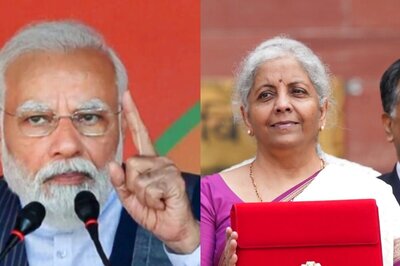
views
New Delhi: Indian markets need not worry about global oil price uncertainty, the finance minister said on Friday, signalling Monday's budget may ease taxes and rationalise subsidies to cushion the impact of surging global oil prices.
Pranab Mukherjee also said India will speed up clearance of payments for Iranian oil and is working with the German central bank on a mechanism for this, aiming to resolve a row that has fed worries about supplies in Asia's third-largest economy.
Iran usually exports around 400,000 barrels per day (bpd) - about 12 percent of India's needs - in trade worth $12 billion a year.
The two-months-old payment dispute comes at a time when oil prices have remained uncertain as a revolt in Libya has disrupted supplies, despite assurances by top oil exporter Saudi Arabia that it will step in to fill any shortfall [O/R].
"No. Oil prices uncertainty is there but the Indian market need not be worried over it, because we are watching the situation and market should not be unnecessarily agitated over it," Mukherjee said in a statement.
At a time when inflation in India is uncomfortably high, the comments from Mukherjee, considered a wily political operator, are seen as an indication that Monday's federal budget could slash duties on crude and refined petroleum products.
Other options such as cutting subsidies that cushion the blow of rising global crude prices on state-run oil retailers remain politically untenable, given that the ruling Congress party-led coalition will go into key state elections due by May.
Tackling the current informal structure of fuel subsidies would help investors put a better valuation on proposed share sales for Indian Oil Corp (IOC) and Oil and Natural Gas Corp, aimed at bringing in more government revenues.
In June 2010 India granted autonomy to oil firms - Indian Oil Corp, Hindustan Petroleum and Bharat Petroleum - to fix prices of petrol but decided to keep controls on diesel, cooking gas and kerosene to rein in inflation and protect the poor.
Since then petrol prices have been hiked at least seven times.
As revolts have rattled governments across the Middle East and North Africa, India, the world's fourth-largest oil consumer, has fretted about supplies, with its Oil Minister S Jaipal Reddy urging OPEC this week to act to calm oil prices.
For India, given the current global supply uncertainties, resolving the payments dispute with Iran, sparked by an Indian central bank decision to scrap the existing clearing house system, has assumed greater urgency.
Some traders have suggested Libyan supply cuts could help Iran place its prompt and relatively cheap barrels in Europe. On Friday, Iran said demand for its oil had increased because of the political upheaval but said it would stick to OPEC output quotas.
On Friday, Indian state-run refiner Hindustan Petroleum Corp (HPCL) said it hoped the government could resolve the row with Iran by the end of March - when current deals expire.


















Comments
0 comment